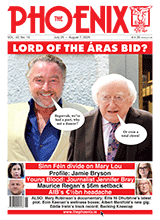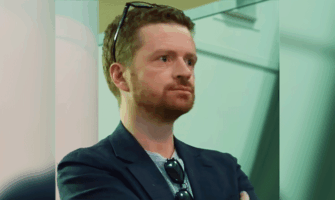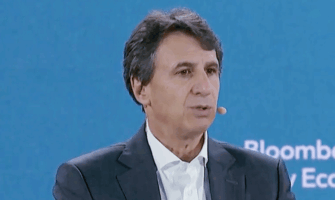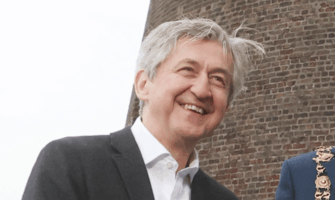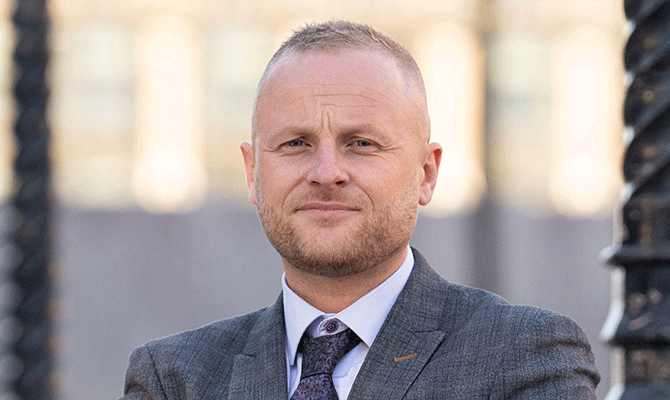
Jamie Bryson
What manner of man is Jamie Bryson, the man who described placing an effigy of immigrants in a boat on a loyalist bonfire in Tyrone as an “artistic political protest”? Like his political hero Napoleon, Jamie is short in stature and like his unionist ally, TUV leader Jim Allister, is happy to deliver his hard-unionist views to anyone who will listen. A ghost of a smile can often be seen playing on his lips as the words, laced with legal references, come spurting out of him like an enthusiastic law student.
Jamie once declared that in his secondary school years, he had no interest in sport. He was, he explained, more likely to be found with his head stuck in a book, often legal. There’s an element of truth to that, but only an element.
Far from becoming a bookish misfit in adult life, Jamie played soccer for Linfield FC reserves, and he was for a time chairman of Donaghadee FC. In fact, Jamie is passionate about his football. He once rushed onto the pitch during a Donaghadee game against a West Belfast team and said things to the referee which he later admitted he wouldn’t want to see in print.
So why did he claim to be a bit of a loner with no interest in sport? Like all great men, an element of mystery envelops him. It is a verified fact that he played the role of ‘Footie’, the NI team mascot, for a Northern Ireland international football game in 2012 against Azerbaijan. “It was one of the proudest moments of my life to stand in front of my countrymen waving Union flags and Northern Ireland flags as they sang God Save the Queen.”
The IFA claimed it was struggling to present northern soccer as sectarian-free and made it clear it would not be calling on Jamie’s services again.
Also, in 2012 Jamie was charged with carrying an offensive weapon, which he claimed he needed to protect him from some drug dealers. He defended himself in court, and while he brought something of a political performance to the role, he was given a four-month suspended sentence.
Head filled with happy mascot memories, Jamie shed his Footie costume and jumped in, studs up, to the flag protest that started in 2012. The Union flag had flown every day for decades over Belfast City Hall; the City Council voted to restrict that to some 180 days per year, and immediately all hell broke loose. Jamie helped organise protests and roadblocks, particularly in North Down and East Belfast. He also co-founded and acted as a leading figure in the Ulster People’s Forum, a short-lived loyalist protest group formed to coordinate flag demonstrations. During the flag-protest period, some 100 police officers were injured.
Bryson says unionists have lost out on flags, parades, bonfires and cultural identity generally, and that this is all part of a campaign of nationalist “appeasement”. Anyone who has spent a summer in NI may gulp and scratch their head at that claim. But in the canon of unionist mythology, unionists are always losing out to ‘them fenians’.
Jamie is perhaps unique among loyalist hardliners in his belief that in the law, loyalism has a valuable ally. He doesn’t have any legal qualifications but says he’s studying for a law degree and is getting good marks.
THE LAW WON
But there have been times when Jamie fought the law and the law won. In 2013 he was imprisoned in Maghaberry for his role in the flag protest. He requested to be placed in the loyalist paramilitary wing, identifying as a “loyalist political prisoner”. Here he shared a cell block with the UDA’s Michael Stone, a man of deep intelligence, according to Jamie. Despite Stone having killed at least six people, Jamie grew to revere this senior loyalist: “Sadly many within Unionism seem to have forgotten about him and others are probably happy to let him rot in prison. I hope that one day Michael Stone can once again be a free man.” Jamie claims to have found sympathy for his views among even the prison warders of Maghaberry. He also speaks of an inner peace found during his period of incarceration, and inspiration to start studying for an Open University degree. Like Edith Piaf, Jamie says he has no regrets and would do it all again.
He colonised the headlines once more in 2015. in connection with the NAMA scandal. A Stormont Finance Committee investigated the £1.2 billion sale of NI assets by NAMA, and Jamie was invited to give testimony under parliamentary privilege. The chair of the Stormont Committee was Sinn Féin MLA Dáithí MacKay and he was anxious that Jamie’s testimony when it came should have the wallop it deserved. Dáithí’s emails referred Jamie to a SF colleague, to help him organise and add edge to his testimony: “Squeeze your best points on this info into 1-2 lines.”
Alas, this coaching of the Donaghadee dynamo became known to the public and it cost Dáithí McKay his political career. Jamie denounced the whole coaching charge as “absolute nonsense” and insisted that he and he alone had shaped his testimony. During his contribution, he alleged corruption among senior political and business people. He described himself as “a whistle-blower”, and, since his claims were made under parliamentary privilege, he was safe from what probably would have been a wig-curling number of defamation suits. Jamie had cemented his image as a strong loyalist voice.
A few years later in the early 2020s, he became more and more involved in judicial reviews and legal arguments about the constitution. As a man unqualified in the law yet steeped in it, Jamie brought multiple judicial reviews against decisions by the NI Executive, the police and the civil service. He also wrote blogs where he used his legal fire-power to highlight unionist grievances.
Oddly, Jamie has never held political office. In 2011 he ran for a seat on the North Down council. He scooped a total of 167 votes –well below what was needed to be elected.
And so he began to focus on matters such as the Windsor Framework. British PM at the time Rishi Sunak argued that the Framework gave NI the best of both worlds – the capacity to trade freely in the UK and the EU. Jamie begged to differ:
“The first thing to say… there is absolutely no legal text which in fact frees the Acts of Union from the present subjugation. That is unsurprising because the Windsor Framework is incompatible with the Acts of Union. … It does not restore the Acts of Union, rather it entrenches the subjugation.”
Jamie kept repeating that NI was in danger of becoming “a vassal state”. With Ian Óg Paisley he helped draft a report via the Centre for the Union: “We cannot recommend… unionist support for the Windsor Framework until additional components are added and existing ones amended”. To his disappointment, the Windsor Framework remains in place.
But perhaps Jamie’s finest hour occurred in 2014. That’s when the DUP were holding a private executive session, where they were debating whether they should return to Stormont and accept the Windsor Framework. To the horror of the DUP and the high merriment of most others, it became clear that someone was feeding live every detail of the secretive event as it happened. And who was receiving this blow-by-blow account and tweeting it? Who else but Jamie? He had, it appeared, someone attending the meeting who was using a hidden microphone to convey to Jamie every twist and turn of the supposedly secret debate. This was real-time espionage and Jamie took total advantage of it. His iconic status was confirmed when Professor Jonathan Tong of Liverpool University dubbed him ‘The man behind the wire’.
Jamie first entered the North’s public consciousness when he became unofficial spokesman for the flag-protestors, and he hasn’t left since. That’s because he’s got unparalleled speed of speech and his message is that of hard loyalism. He’s not, he would insist, a loyalist paramilitary, but he is, as they say, “close to their thinking.’’ He is used as a kind of human megaphone, through which hard loyalism lets its views be known to the waiting world.
Like Ian Paisley Senior, Jamie presents himself as a strong and reliable voice opposed to the double-dealing of establishment figures. He repeatedly warns the unionist community against the efforts being made to ease NI out of the UK. While he may not yet have legal qualifications, he has a talent for unearthing age-old legal precedents that support his argument. He has launched several judicial reviews that challenge (unsuccessfully) the Windsor Framework. He writes policy papers for the Centre for the Union.
Law Library denizens may or may not be impressed by his collaboration with Dublin judge, Richard Humphreys in production of a pamphlet, Constitutional Balance, the Acts of Union and the Principle of Consent, written by Jamie but containing a foreword from Humphreys who supports a United Ireland.
He is loyalism’s buzzing wasp, hurling himself against the glass wall of respectable unionism. He was the boy/man who established the Loyalist Community Council, which allows shadowy figures to say whatever they wish while being protected by the Bryson factor. If there’s a radio or TV debate about some political issue, Jamie is assured of a hearing. His boyish appearance and his uncompromising stance are guaranteed to bring heat if not light to any discussion related to loyalism.
Jamie as I say is a fan of Napoleon (“Take time to deliberate, but when the time for action comes, stop thinking and go in”), and shares platforms with hardliner MLA, Jim Allister.
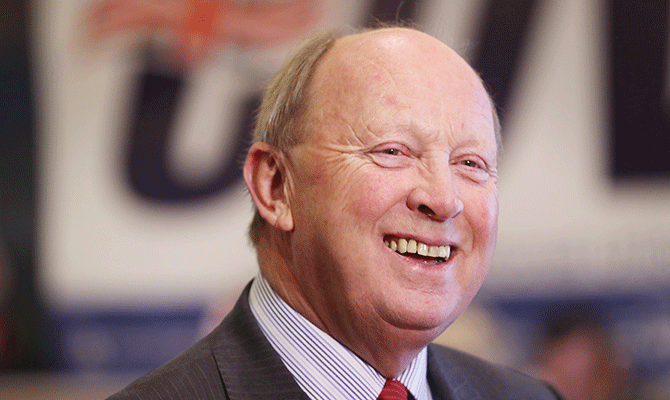
Jim Allister
ST PATRICK A PROTESTANT?
As a rule, though, Jamie likes to travel solo and do the talking. This may be due to an experience when he was campaign manager for Ruth Patterson, a former DUP member who in 2016 was running for a seat in Stormont. Jamie handled her campaign’s messaging, strategy and public relations. In the course of the campaign, Jamie accompanied Ruth to an interview on BBC Radio Ulster. Jamie adopted a listening role which was a pity, because half-way through the interview, the subject of St Patrick arose. “Of course,” candidate Ruth cheerfully observed, “St Patrick himself was a Protestant!” There was a tumbleweed moment of silence with Jamie staring at a point on the studio wall and Ruth’s smile shrinking. Then the moment passed and the BBC presenter explained to Ruth that St Patrick would have had difficulty espousing the Protestant faith, since he lived in the fifth century and the Reformation didn’t happen until the sixteenth century. Ruth didn’t get elected.
Since that omnishambles, Jamie has been avoiding campaign manager roles the way a once-scalded cat avoids all stoves, even cold ones. However, the frequency of his presence on local BBC programmes has led to some suggesting he carries a sleeping bag and sleeps under a news desk in Belfast’s Broadcasting House.



